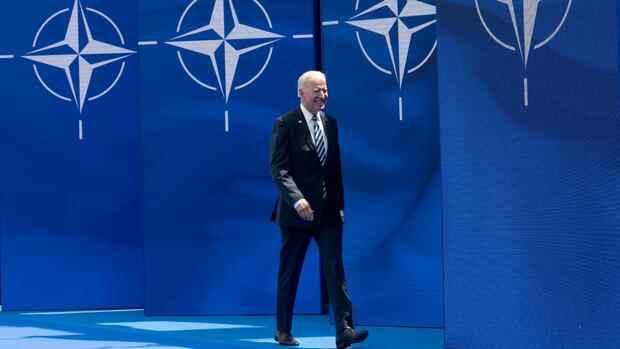Brussels, New York Was there something? Yes, there was something – quite a bit. There was the Afghanistan debacle, the frantic withdrawal of US troops and the anger of European allies at the unilateral decisions of the White House.
There was the anger of the French when shortly afterwards the USA, together with the British, stole a lucrative submarine deal from them with Australia and launched the new Pacific security pact Aukus. And there was the anger at America First’s policy of procuring the corona vaccines.
The Europeans had imagined the restart of transatlantic relations under US President Joe Biden differently. That was the mood in many European capitals until a few months ago: depressed to bad. But the quarrels are now forgotten or at least repressed.
In the face of the war in Ukraine, the Americans and Europeans are working together more closely than they have in decades. US intelligence services share their insights into Russian troop movements and Kremlin plans. The American financial authorities are coordinating their sanctions with their partners in the EU and in the G7 industrial states club. In order to strengthen NATO’s eastern flank, the US has deployed 100,000 additional troops to Europe.
Top jobs of the day
Find the best jobs now and
be notified by email.
Air Force One lands in Brussels on Wednesday evening, for the second time in just nine months. Biden wants to meet with NATO partners, G7 leaders and EU leaders before flying on to Poland, the frontline state in the new cold war with Putin’s Russia.
Putin responsible for transatlantic unity
The trip is to “discuss our efforts to help Ukraine and impose heavy costs on Russia for the invasion,” Biden said before leaving. It is about showing the world that the West stands together in the “defense of democracy”: “Putin thought he would divide us, but we are stronger than ever in recent history.”
Biden hints: the main credit for the transatlantic unity goes to the head of the Kremlin. Vladimir Putin shattered Europeans’ sense of security with his brutal attack on Ukraine. Without the shock of the unexpected aggression, Europeans and Americans would hardly have pulled themselves together in this form.
In addition, however, the alliance-oriented policy of the US government also played an important part in the renewed unity of the West. Biden actually wanted to prepare America for the rivalry with rising China and the great power conflict in the Pacific – and is now revitalizing the Atlantic alliance by involving the Europeans, not pushing them around like some of his predecessors, but treating them as equal partners.
Biden was already considered the wrong choice for some commentary goals, and the Democrat sometimes seemed jittery and unfocused in public appearances. The opposition Republicans tried to portray the 79-year-old as senile.
More on America’s President Joe Biden:
Now the President has found his role: as the moderating leader of the free world – and Europe’s best man. Without US backing, Europeans would not be able to take a hard line against Putin, diplomats and experts in Brussels are convinced.
The US is pushing for strict enforcement of the sanctions
Biden’s national security adviser Jake Sullivan outlined the president’s agenda at a White House news briefing on Tuesday. Sullivan announced that Biden and his European allies want to adopt new sanctions against Russia.
The primary aim should be to “prevent the circumvention of the sanctions that have been imposed and which are still to be tightened and to ensure their consistent enforcement,” as Sullivan said. In doing so, he indicated measures that could also be taken by countries that continue to do business with Russia and circumvent Western sanctions. China and India, for example. In addition, the US administration wants to announce “joint measures” to improve energy security in the EU in order to reduce Europe’s dependence on Russian gas.
The US has imposed far-reaching sanctions on Russia, shipped billions of dollars worth of weapons and provided extensive financial aid.
So far, Biden’s efforts have paid off, praise experts. “The military and economic support for Ukraine is unprecedented, as is the package of sanctions that the US and Europe have introduced against almost every sector of Russia’s economy,” says Rachel Rizzo of the Atlantic Council think tank.
It is clear that Biden will not push for an immediate freeze on Russian oil and gas imports. Before the important US midterm elections in autumn, the US President finds it convenient that the EU is divided on this issue: Germany, among others, is opposed to such an embargo in view of its dependence on Russian energy supplies. If the EU were to join the oil boycott, there would be considerable price pressure because even more countries would be competing for non-Russian sources.
It is true that Russian imports serve only a small part of US oil demand: Specifically, crude oil and oil products from Russia account for only 8 percent of total American oil imports and less than 2 percent of the total supply. But petrol and gas prices have also risen sharply in the USA. A topic that troubles Biden domestically.
According to Sullivan, the US government in Brussels will also discuss the long-term realignment of NATO forces and contingencies in the event of a nuclear weapons deployment. In other words, the alliance wants to strengthen deterrence against Russia.
Recently, Putin had implicitly threatened to use nuclear weapons. Countries that opposed Russia risked “consequences unprecedented in their history,” said the Kremlin chief at the start of the invasion.
Biden has ruled out that the United States will intervene in the war with Russia with its own soldiers. He also rejects a no-fly zone over Ukraine. But the Americans would resolutely defend NATO territory – “every centimetre”, as the President assured them.
More: Kremlin warns of NATO peacekeeping mission in Ukraine – the West is preparing new sanctions
